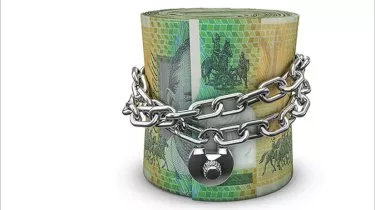Borrow
What are term deposit interest rates?
When deciding where to stash your hard-earned savings, there are several factors to take into consideration.
What are term deposit interest rates?
When deciding where to stash your hard-earned savings, there are several factors to take into consideration.

People looking to grow their money prefer to take on a strategy that will put their savings to work without too much risk. Term deposits are a popular choice among risk-averse investors due to its fixed interest rate that is usually higher than what other savings or transaction accounts offer.
A large number of investors consider the interest rate to be a main factor when choosing a term deposit. The competitive interest rates on term deposits provide an opportunity to increase your money faster without the higher risk aspect that is usually associated with other types of investments, such as stocks or mutual funds.
To help you decide, here is a primer on term deposit interest rates, how it works, and why it might be the best savings option for you.
What is a term deposit?
A term deposit is a type of savings account in which your money is locked away for a certain period of time. Term deposits can have fixed terms of between one month and five years. During this period, your funds earn interest according to the interest rate offered by the financial institution when you open the account.The end of the term is called “maturity”.

Term deposits are generally viewed as safe and low-risk investments, making it an ideal option for cautious savers. A term deposit ensures that your money will continue to accrue interest at a fixed rate for a fixed period, so there is minimal to zero chance of losing your money.
Unlike savings accounts, the interest rate on term deposits are fixed and will not change throughout the agreed term. Because your money is locked away, financial institutions often offer higher interest rates on this fixed investment than other savings options. Banks typically use this money for funding.
What is the interest rate on term deposits?
Term deposits accrue interest rates closely similar to savings accounts and are highly reflective of the cash rate. The cash rate is set by the Reserve Bank of Australia (RBA) during the first Tuesday of every month (except in January). Interest rates are based on the price of borrowing from the large lenders, so this cost is usually passed on to savers.
When the cash rate is low, it is less costly for lenders to borrow from the RBA. Therefore, banks don’t benefit from offering savers a high interest rate, because it is easier for them to get their funds from RBA. Due to the record-low cash rate trend, most term deposits do not offer higher than 3 per cent per annum interest rate.
While term deposit interest rates are fixed, they tend to vary depending on how long you will deposit your money. Term deposits with longer terms usually have a higher interest rate than ones with shorter terms. This is to encourage customers to lock away their money for a longer period of time so the bank can use that money.
How are interest rates on term deposits calculated?
Term deposit interest is calculated based on the amount of your deposit, how long your chosen term is and the interest rate. The frequency of repayments can also lead to varying interest rates on the same term.
How do I open a term deposit account?
Opening a term deposit account is a simple process. You will need to provide your personal details, including your name, address, contact number, proof of ID, tax file number and a nominated bank account where your funds will be deposited into at maturity.
Some term deposits require a minimum amount. The range can be around $500 to $1,000 but can be more than $100,000 for some term deposit accounts.
Authorised deposit-taking institutions (ADI), including banks, credit unions and building societies, can offer term deposits. You can find a list of ADIs on the Australian Prudential Regulation Authority’s website here.
Another reason why this financial product is considered a safe investment is because of the government guarantee on term deposits. The government guarantees deposits of up to $250,000 with an ADI. This means that if ever your ADI were to collapse, you can recover up to $250,000 of your money that will be provided by the government. This guarantee applies per customer and per ADI.
Most term deposits charge a fee or a penalty if you withdraw your money before your maturity term is up. To learn more about penalties on term deposits, read here.
How do you choose the best term deposit?
Like the majority of financial products, it is difficult to say which term deposit account is the best. What works for other people might not be the right option for you. You should choose an account that will be suitable for your needs and will work best for your situation.
If you are looking for a term deposit, here are the three main things experts say you should look for:
- A competitive term deposit rate
- A term period that is suitable to your situation
- A minimum deposit that you can comfortably put away
When opening a term deposit, make sure to read the terms and conditions beforehand and ask for additional information. You can ask about how often the interest is calculated or how often you will receive statements about your deposit. It is also important to understand what will happen if you break the term of your deposit.
You should also be aware of what happens when the deposit matures and what you should expect. At the end of a term, some providers automatically roll over your deposit into a new one, unless you instruct them otherwise.
Conclusion
If you are looking for a low-risk and safe way to grow your spare funds, a term deposit might be your best option. It removes the temptation to spend your money and needs almost little to no maintenance. Term deposits also provide an opportunity for a near-guarantee return on your investment.
Before opening a term deposit, make sure to do your research and know which one is best for you. Finding the right term deposit for your situation can help you attain your savings goal at a faster rate.

Personal cash loans
The smart borrower’s guide to managing personal loans
Personal loans can be a strategic tool for managing finances, whether consolidating debt, financing a large purchase, or covering unexpected expenses. However, borrowing money comes with the ...Read more

Personal cash loans
Will these changes to joint account data sharing impact you?
The government is being asked to respect citizens’ rights to consent to data sharing after the Treasury’s opt-out join account data sharing model failed to impress consumer groups. Read more

Personal cash loans
Will a personal loan hurt my credit rating?
Like any other form of credit, a personal loan can affect your credit score, either positively or negatively, so it is important to know the risks and advantages before you take on one. Read more

Personal cash loans
Can you negotiate term deposit rates?
Getting the best interest rate is the key to making extra money in the long term. It may come as a surprise, but negotiation is one of the best ways to maximise your term deposit rate. Read more

Personal cash loans
Will personal loans affect my mortgage application?
A personal loan isn’t completely bad news in the eyes of mortgage lenders. Read on to see how your personal loans can affect your mortgage application. Read more

Personal cash loans
What is a personal cash loan?
A personal cash loan is a type of secured or unsecured loan that typically have terms ranging from six to 60 months. Read more

Personal cash loans
Buying now for happiness later
Four in five Australians think the use of buy now, pay later services improves their happiness and self-esteem, a report has revealed. Read more

Personal cash loans
Short-term ‘predatory’ lending practice banned
ASIC has announced a ban on a short-term loan model that saw consumers able to be charged fees that added up to almost 1,000 per cent of the original loan amount. Read more

Personal cash loans
The smart borrower’s guide to managing personal loans
Personal loans can be a strategic tool for managing finances, whether consolidating debt, financing a large purchase, or covering unexpected expenses. However, borrowing money comes with the ...Read more

Personal cash loans
Will these changes to joint account data sharing impact you?
The government is being asked to respect citizens’ rights to consent to data sharing after the Treasury’s opt-out join account data sharing model failed to impress consumer groups. Read more

Personal cash loans
Will a personal loan hurt my credit rating?
Like any other form of credit, a personal loan can affect your credit score, either positively or negatively, so it is important to know the risks and advantages before you take on one. Read more

Personal cash loans
Can you negotiate term deposit rates?
Getting the best interest rate is the key to making extra money in the long term. It may come as a surprise, but negotiation is one of the best ways to maximise your term deposit rate. Read more

Personal cash loans
Will personal loans affect my mortgage application?
A personal loan isn’t completely bad news in the eyes of mortgage lenders. Read on to see how your personal loans can affect your mortgage application. Read more

Personal cash loans
What is a personal cash loan?
A personal cash loan is a type of secured or unsecured loan that typically have terms ranging from six to 60 months. Read more

Personal cash loans
Buying now for happiness later
Four in five Australians think the use of buy now, pay later services improves their happiness and self-esteem, a report has revealed. Read more

Personal cash loans
Short-term ‘predatory’ lending practice banned
ASIC has announced a ban on a short-term loan model that saw consumers able to be charged fees that added up to almost 1,000 per cent of the original loan amount. Read more










